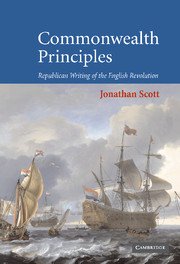
-
Select format
-
- Publisher:
- Cambridge University Press
- Publication date:
- 22 September 2009
- 18 November 2004
- ISBN:
- 9780511490736
- 9780521843751
- 9780521035736
- Dimensions:
- (228 x 152 mm)
- Weight & Pages:
- 0.805kg, 416 Pages
- Dimensions:
- (228 x 152 mm)
- Weight & Pages:
- 0.622kg, 416 Pages
You may already have access via personal or institutional login
Book description
The republican writing of the English revolution has attracted a major scholarly literature. Yet there has been no single treatment of the subject as a whole, nor has it been adequately related to the larger upheaval from which it emerged, or to the larger body of radical thought of which it became the most influential component. Commonwealth Principles addresses these needs, and Jonathan Scott goes beyond existing accounts organized around a single key concept (whether constitutional, linguistic or moral) or author (usually James Harrington) to analyse this body of writing in full context. Linking various social, political and intellectual agendas Professor Scott explains why, when classical republicanism came to England, it did so in the moral service of an explicitly religious revolution. The resulting ideology hinged not upon political language, or constitutional form, but Christian humanist moral philosophy applied in the practical context of an attempted radical reformation of manners.
Reviews
'Commonwealth Principles demonstrates the range, vigour and intrigue of intellectual English Republicanism.'
Source: The Times Literary Supplement
'Commonwealth Principles presents a coherent and confident overview.'
Source: The Times Literary Supplement
'… deserves to command the attention of a wide readership of early modern historians, and will asuredly stimulate further research into the ideological composition of seventeenth-century republicanism.'
Source: Journal of Ecclesiastical History
Contents
Metrics
Altmetric attention score
Full text views
Full text views help Loading metrics...
Loading metrics...
* Views captured on Cambridge Core between #date#. This data will be updated every 24 hours.
Usage data cannot currently be displayed.
Accessibility standard: Unknown
Why this information is here
This section outlines the accessibility features of this content - including support for screen readers, full keyboard navigation and high-contrast display options. This may not be relevant for you.
Accessibility Information
Accessibility compliance for the PDF of this book is currently unknown and may be updated in the future.


